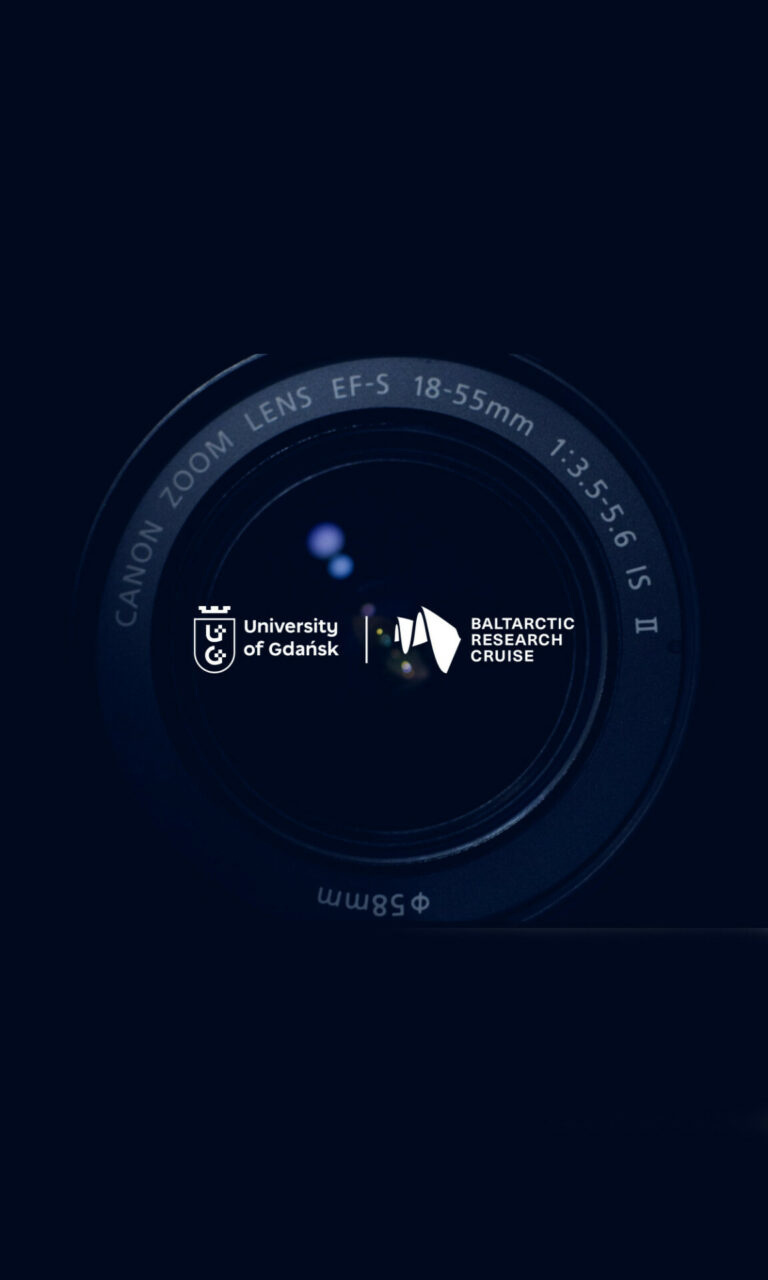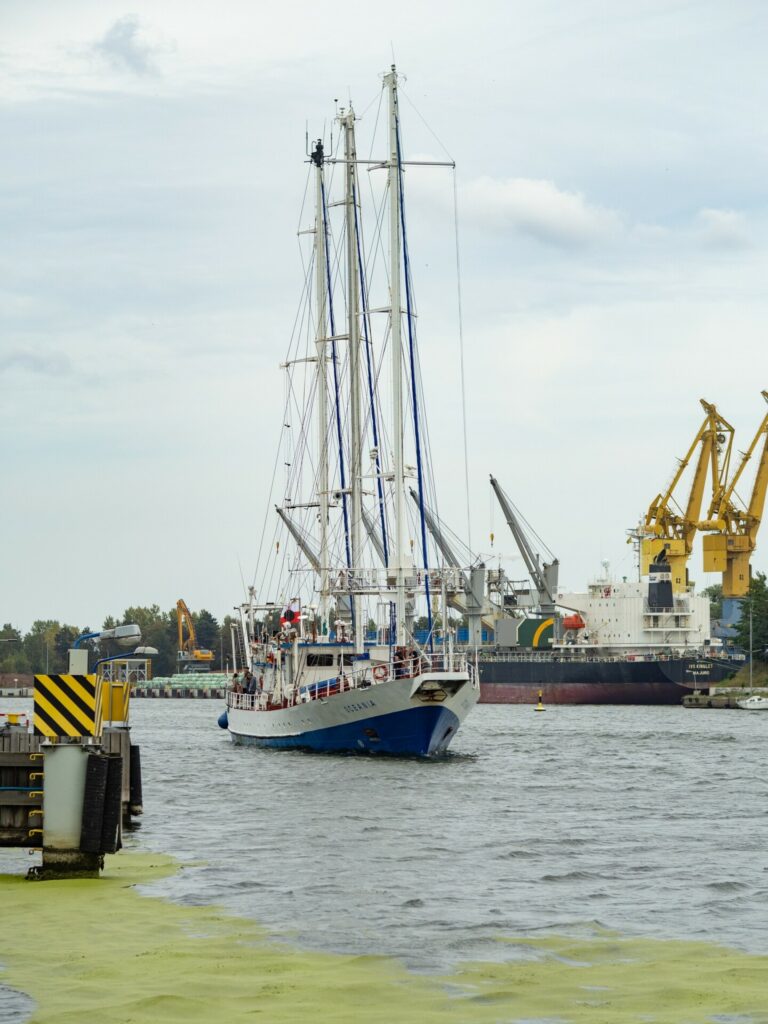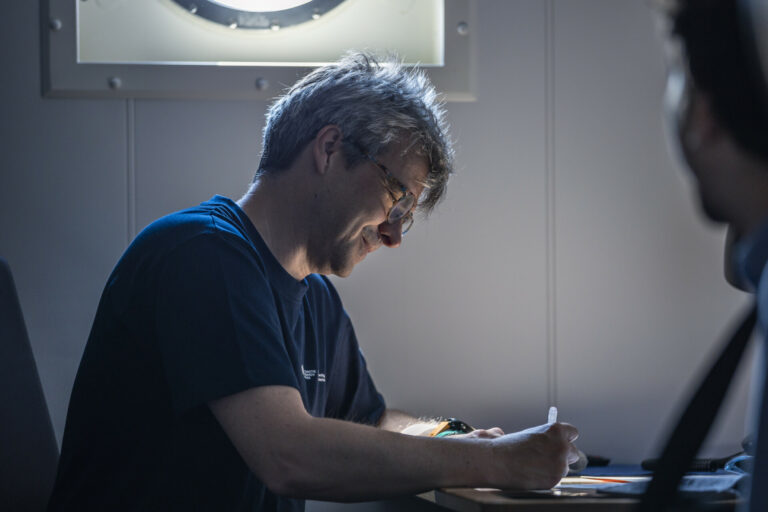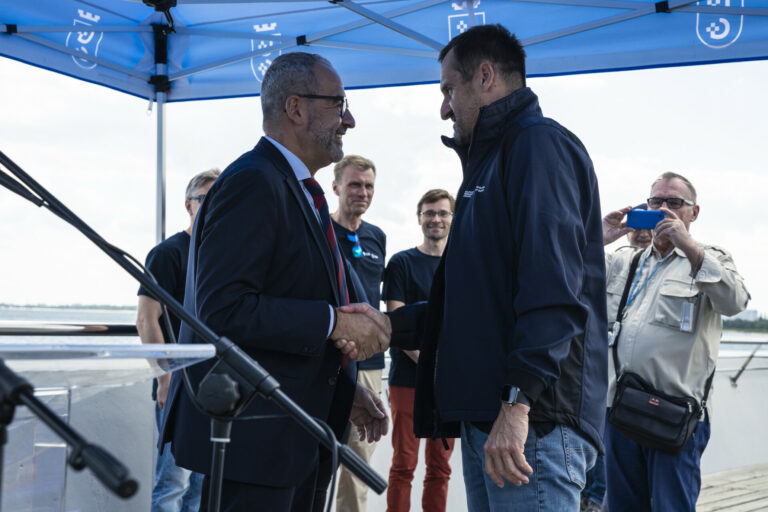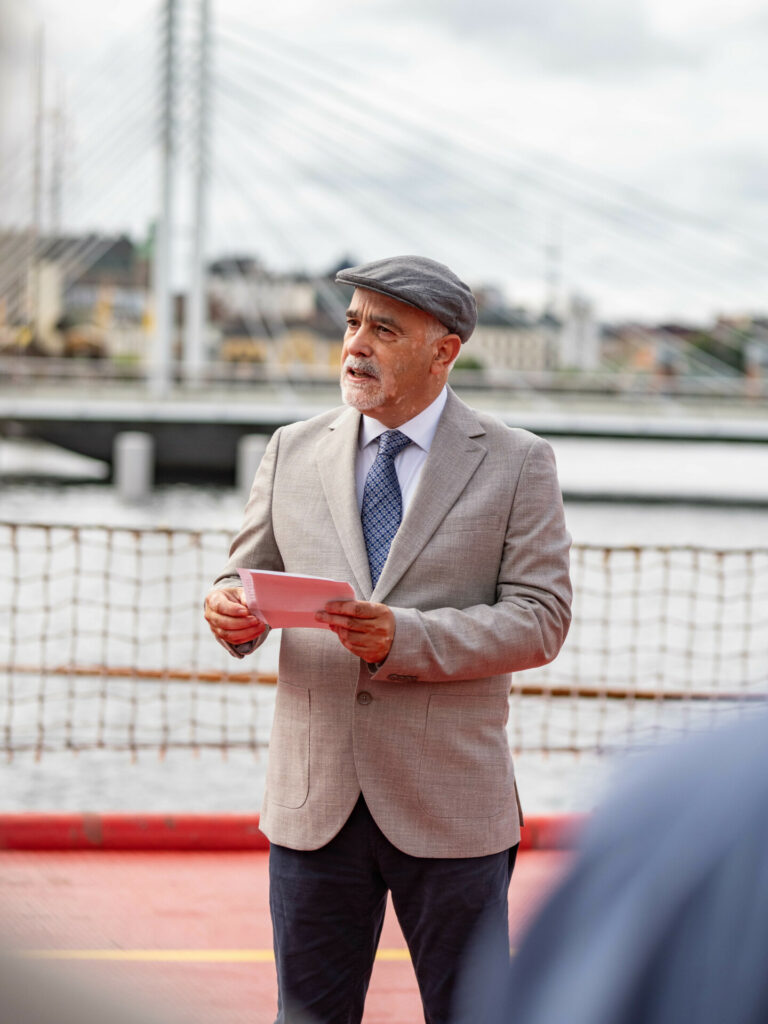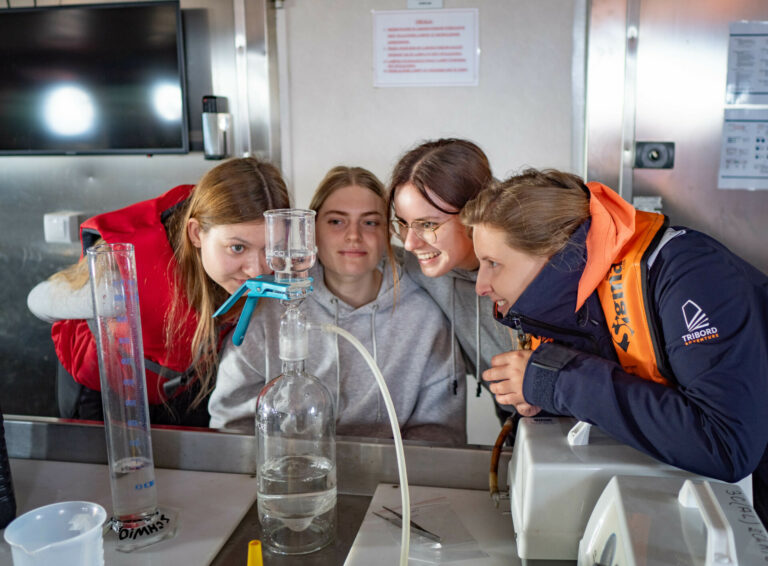How did renowned Polish writer Zygmunt Miłoszewski join the BaltArctic Research Cruise? What will be his role during the voyage, and when did he develop a love for the sea?
Karolina Żuk-Wieczorkiewicz: One of your passions is sailing. Soon, you will take part in a unique cruise: a research expedition on board the University of Gdańsk research vessel Oceanograf. How did it happen that you joined this adventure?
Zygmunt Miłoszewski: It is not my first marine adventure and just like in case of previous ones, it all began with literature. With every book, after I more-less know what it would be about, I start looking for information and experiences that might be useful. A few years ago I decided to write a novel with some marine elements, as since childhood, I associated them with the real adventure. So I ended up with my sailor-father-in-law on a yacht in the middle of the ocean and – besides novel material – I discovered how wonderful it is, when the land disappears behind your back and you are left with nothing. In the world where there is too much of everything, this ‘less’ becomes very attractive. It was the beginning of the adventure that led me to intense sailing and allowed me to gain a whole new set of skills as a middle-aged person.
And how did you become a participant of BaltArctic research cruise?
My brother and I wrote a screenplay of an adventure radio show called ‘Mierzeja’ (‘The Sandbar’) whose action took place on Hel Penninsula, and the heroine was a scientist working in ‘sealarium’. University of Gdańsk was delighted not only that the main character was a UG scientist, but also that we used the full name: ‘University of Gdańsk Hel Marine Station’. Besides, when my brother and I were working on the show, we lived in Hel; we met now-deceased Professor Krzysztof Skóra, who back then supervised the Station. We somehow became buddies with UG; then I wrote my marine novel, we talked about joined projects, maybe giving classes on creative writing, maybe using r/v Oceanograf in my fiction. And suddenly, there is this new project: scientific one, but educational and artistic as well – and just like on board of old sailing ships, a person of writer and chronicler could be of use.
How did you react to this proposal?
Enthusiastically! Most importantly, because it is a scientific voyage – and the possibility of encountering new people, new sensitivities, and new professions is always priceless to the writer; the ideas for books come from life, not from head. Of course, I warned Dear Rectors, that I am adventure books writer and taking me to the ship is a bit risky move. I won’t write a story about people who – imbued with the love of science – will gaze towards the setting sun and conclude: ‘Oh my goodness, the science in the European Union makes sense, this ship looks so nice and so do we, let’s maybe kiss after obtaining mutual consent’. I write adventure novels. So there is no knowing of what I will do with the ship. Maybe I’ll sink it (and maybe not); maybe I’ll turn it upside down (and maybe not); maybe I’ll crowd it with scientists studying sea spaces, and maybe it will be captured by Tricity hippies who will use it to colonise the Faroe Island for Poland.
So more of the writer than a chronicler.
I will obviously be happy to play the chronicler during the cruise. But besides that, I already have some ideas – and these are the ideas of an adventure novelist, who makes up incredible stories and allows the readers to live them through. And it requires treating the reality in a way that is… uhm… creative.
I want to add I am truly glad it is Norway I’m going to sail to. Scandinavia is my favourite region in the world. A year ago, I made my sailing dream come true and I sailed into the fjord nearby Stavanger. The chance to go even further is fascinating and it fits in perfectly to my new novel that mostly happens in the North.
You mentioned Scandinavia is your favourite region and you have already had a chance to explore it from the sea. How do you prepare to such expeditions? What would you advise to people who plan on cruising in such cold areas?
When it comes to sailing in Northern Europe, the basic piece of equipment is a hat. Three hats, actually. One on your head, second one is drying, and the third one spare. Even when it is warm, it is cold on the sea. Even when there’s no wind – there is wind on the sea. All my sailing adventures in this part of Europe so far are the memories of wearing a hat throughout the whole summer, although there was a heat wave on land and people were dying of high temperatures.
Coming back to the cruise: I hear you have some writing plans, adventure plans. Do you have any expectations about the voyage or are you just going to ‘seize the day’?
I know how astonishing Norway looks like from the sea, those raw mountains stemming from the ocean. It is majestic, mystical, and slightly terrifying experience. Sailing along almost unpopulated Norway is very specific – sometimes you see nothing but grey granite rock for miles and miles. It is a strange feeling of both loneliness and belonging to something greater than us and our in fact quite funny civilisation. This is something I am looking forward to. I am also curious of the scientific aspects – whether they will be interesting. Science often shows up to be much less exciting in practice than in theory.
Or less exciting than in books.
Exactly. For some of my friends, research cruise sounds almost scary; they imagine people with the look of steel who discover new species of krakens in the Norwegian Sea. In reality, there will probably be some can dragging after the ship and collecting data to some tables. I may, however, be positively disappointed. I am happy to meet new people, people from outside my environment, and I am happy that the cruise will be long enough that we will have to talk to each other. There is a marine saying that what you say in cockpit, stays in cockpit. During the night’s watches, you often say things you would never say in any other circumstances; things that need to be things that need to be taken out, that haunt us at nights. Everyday life permits us not to notice many emotions and thoughts as so much happens around us. At sea, each wave brings a mirror – you finally have to look and see yourself.
Any expectations?
I silently pray to Mother Nature that the food is better than during my last long cruise from the Netherlands to Chicago. I promise myself more after this voyage – but on the other hand, it is a public sector, so wages may be as in hospitals or prisons.
I don’t suffer from sea sickness (although we’ll see – catamaran may swing strangely) neither am I afraid of the weather – these waters are not easy although I trust the crew. But I did see the cruise agenda and I must say that my first impression was it is very optimistic, everything is written down to the hour. And the sea is not keen on plans. In merchant navy, all plans are marked with AGW WP letters – ‘All going well, Weather Permitting’. So there is a plan, but it will be only carried out if everything is ok and the weather allows it.
So you say we should always have respect for the sea?
Especially when we are talking about the North: Atlantic can be wandered by monstrous lows from whom the research vessels would probably have to hide in Norwegian fjords. On the one hand, I like calm cruises with nice weather – on the other, there is no such thing as safe adventures.
Are there any estimations on when we could expect the book?
It’s too early to say. For now, the only thing I have is an idea what to do with r/v Oceanograf. But I don’t want to go into details so that I don’t lose my boarding pass.
Let me then wish you good luck, beautiful adventures, and tasty food. Thank you for conversation.
Title photo: ©Kuba Celej

